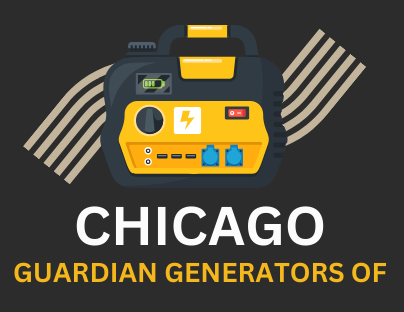Whole House Generators in Englewood IL
A whole house generator is a backup power system designed to provide electricity to your entire home during a power outage. Unlike portable generators, which only supply power to specific appliances or circuits, a whole house generator is permanently installed and connected to your home's electrical system. It automatically kicks in when the main power supply fails, ensuring that all your electrical systems, from lights to refrigerators, continue to function seamlessly.
Importance of Having a Whole House Generator
Power outages can occur unexpectedly due to severe weather, utility failures, or other unforeseen events. Having a whole house generator ensures that your home remains functional and comfortable even when the grid is down. It can keep essential systems running, such as heating and cooling, refrigeration, medical equipment, and security systems. This added layer of security not only protects your property and belongings but also provides peace of mind, knowing you won't be left in the dark.
Types of Whole House Generators
Whole house generators generally come in two types: standby and portable.
- Standby Generators: These are permanently installed and are usually powered by natural gas or propane. They are capable of automatically starting and stopping, providing a seamless transition of power. Standby generators are ideal for homeowners looking for a reliable, hands-off solution.
- Portable Generators: Though less common for whole house use, portable generators can provide temporary power to a home when properly connected. They run on gasoline and require manual setup and operation. They are typically less powerful than standby generators and are often used as a temporary solution.

Key Considerations When Choosing a Whole House Generator
When selecting a whole house generator, consider the following factors:
- Power Requirements: Assess the total wattage needed to power all essential systems in your home. This includes lighting, appliances, HVAC systems, and any other critical devices.
- Fuel Type: Decide whether you prefer a generator that runs on natural gas, propane, or diesel. Each fuel type has its own benefits and limitations in terms of availability and storage.
- Size and Capacity: Choose a generator that fits your space and meets your power needs. Oversizing can be costly, while undersizing might not provide adequate power.
- Automatic Transfer Switch: Ensure that the generator you select comes with an automatic transfer switch, which will automatically switch the power source from the grid to the generator during an outage.
Installation Process
Installing a whole house generator involves several steps:
- Site Assessment: A professional will assess your property to determine the best location for the generator. This includes considering factors like ventilation, proximity to fuel sources, and space.
- Permits and Codes: Obtain necessary permits and ensure compliance with local building codes and regulations. This ensures that your generator installation meets safety and legal standards.
- Foundation and Placement: The generator will be placed on a solid, level foundation to ensure stability. This could be a concrete pad or a gravel base.
- Electrical Connections: The generator will be connected to your home's electrical system via an automatic transfer switch. This setup allows the generator to start automatically and supply power during an outage.
- Testing: After installation, the system will be thoroughly tested to ensure it functions correctly and reliably.
Maintenance Tips for Longevity
To ensure your whole house generator remains in optimal condition, follow these maintenance tips:
- Regular Inspections: Have your generator inspected by a professional at least once a year to check for any wear and tear or potential issues.
- Routine Testing: Run your generator periodically, even when there are no power outages. This helps ensure that it starts correctly and is ready to go when needed.
- Keep it Clean: Ensure the generator and its surroundings are clean and free from debris. This helps prevent overheating and damage.
- Check Fluid Levels: Regularly check and maintain the oil, coolant, and fuel levels as per the manufacturer's recommendations.
- Replace Parts as Needed: Replace air filters, spark plugs, and other parts as needed to maintain optimal performance.
Cost Considerations
The cost of a whole house generator can vary widely based on several factors:
- Generator Size and Capacity: Larger generators with higher capacities will generally cost more.
- Fuel Type: The choice of fuel can affect the overall cost, including installation and ongoing fuel expenses.
- Installation Costs: Professional installation adds to the initial expense. Costs may include site preparation, electrical work, and any necessary permits.
- Maintenance: Factor in the cost of regular maintenance and any potential repairs.
Safety Precautions
Safety is crucial when dealing with whole house generators. Follow these precautions to ensure safe operation:
- Professional Installation: Always have your generator installed by a licensed professional to ensure it is set up correctly and safely.
- Ventilation: Ensure the generator is placed in a well-ventilated area to prevent the buildup of dangerous fumes.
- Proper Use of Fuel: Store and handle fuel properly to avoid spills and leaks. Follow the manufacturer's guidelines for fuel storage and use.
- Carbon Monoxide Detectors: Install carbon monoxide detectors in your home to alert you to any harmful gas leaks.
What We Offer
At our company, we provide comprehensive
whole house generator services in Englewood, IL. Our offerings include:
- Residential Generators
- Commercial Generators
- Portable Generators
- Electric Generators
- Propane Generators
- Solar Generators
- Generator Repairs
- Generator Maintenance
- Generator Parts
Ready to enhance your home's reliability with a whole house generator? Contact us today to schedule a consultation or to learn more about our services. Our team is here to help you ensure that your home stays powered, no matter what. Reach out now and take the first step towards uninterrupted power and peace of mind.
